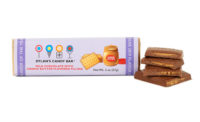2007 Executive Team of the Year
Hey, Bar Vendor!
Hey, Bar Vendor!
By Dan Malovany
By partnering with Bloomfield Bakers, a leading contract manufacturer of baked goods, Roman Meal ventured into the snack bar category. It might be the beginning of something so big that both companies are tipsy with anticipation.
Good bartenders know how to listen and give their customers exactly what they want. Great bartenders, however, have the reputation of whipping up something magical that exceeds their customers’ expectations.
In the baking industry, the bartender extraordinaire is Bloomfield Bakers, which produces snack bars, cookies, crackers and other premium cereals and baked goods for many of the largest food companies in the nation. In fact, among Fortune 200 companies, the Los Alamitos, Calif.-based contract manufacturer is so well known for what it does that everybody seems to know its name.
So when Roman Meal Co., Tacoma, Wash., decided it wanted to branch out beyond the bread category and start selling snack bars and other whole grain products under its well-established brand, it wasn’t difficult to track down Bloomfield Bakers. Actually, a mutual friend at a major flour miller recommended Bloomfield Bakers to Dan Scrivner, director of new business development for Roman Meal. What he found was a near perfect fit for executing Roman Meal’s new business model.
“Part of our strategy is to have five active product lines by the end of this year,” Scrivner notes. “At first, we wanted to put out snack bars, but when we came in and saw all that they did here, a lot of what they produce is on our target list for category growth.
“It just excited us about the potential beyond our first snack bars because of the other items they produce,” he says.
To Sam Calderon, president of Bloomfield Bakers, teaming up with Roman Meal made sense.
“What I like is that they had a brand that is very recognizable and that can be taken and put over a whole breadth of products,” he explains. “Roman Meal means healthy, and that’s a lot of what we do. It’s about wholesome whole grains. We like to work for these kinds of companies. We bake for many companies like theirs and consider them an asset to us.”
In the world of contract manufacturing, finding the right co-packer can be a tricky process. Likewise, Bloomfield Bakers has to conduct due diligence in selecting which customers are good for its business. Just because a potential client dreams up a new product doesn’t mean that it’s supported by a viable business plan.
“Everybody promises truckloads, and sometimes you end up with much less, so we try to qualify the customer,” Calderon says “When we first started, we took everyone. Now, we must be selective. We’re trying to move away from the smaller companies that have one shift every four months. It takes us half of the day to get used to what we ran the last time. The potential for [Roman Meal] is huge.”
Roman Meal qualified as a good candidate because the company strategy to produce whole grain snack bars, crackers and hot cereal aligns nicely with the capabilities of Bloomfield Bakers, which produces 1,000 different products on six lines in its 100,000-sq.-ft. Los Alamitos plant and on 15 lines at its 211,000-sq.-ft. facility in Azusa, Calif.
“You want to come to a contract baker with volume because that’s the first question that they ask,” says Todd Kluger, brand marketing director for Roman Meal. “It’s great to have an idea on a new product, but you need to have a way to sell it and distribute it or it won’t work.”
Currently, Scrivner adds, Roman Meal has good distribution of its snack bars in major supermarkets and other retailers along the West Coast. The company also is building a network of brokers as is expands east of Colorado in its eventual goal of attaining national distribution for its new products. Bloomfield Bakers’ versatile manufacturing platform makes it easy to work with companies such as Roman Meal as it ramps up sales and executes its new business strategy. The contract manufacturer’s plants house tunnel ovens that range from 60 to 240 ft. and can produce anywhere from 10,000 to 30,000 lb. of crackers per shift.
“We have a couple of lines that can do 180,000 to 200,000 bars per shift,” Calderon says. “We’re unique in that we have one line that will produce 80,000 bars a shift. It’s not priced as well as the faster lines, but it’s good for start-up situations. We can make as little as 150 bars per minute or as much as 490 bars per minute.”
In addition, Calderon refers to his team as “the short-order cooks of the baking industry” because they work with their customers to produce a variety of limited-time offers and seasonal items, which have become increasingly popular over the last decade.
“What we can do when someone comes to us like Roman Meal is actually build a brand of products and a portfolio that has some significance,” says Bill Ross, who founded the company with Harold Rothman in 1974. “We don’t just produce cookies or crackers.”
It actually does a lot more.
Brewing Up New Products
Bloomfield Bakers began by producing icings and dairy products for retail chains, branched out to produce ice cream inclusions in the 1980. Then, it hopped on the snack bar highway that drove health and nutrition trends in the snack and baking industry during the 1990s.
Throughout its history, the focus has been on producing premium as opposed to price-driven private label brands. The company produces some of its own branded product, but that volume accounts for less than 5% of sales.
“We never wanted to do the bottom-of-the-line products, but the value-added and specialty, destination type of items that every Tom, Dick or Harry can’t make,” Ross says.
Today, the company has 900 employees working in two plants, which are Kosher-approved, organic-certified by Oregon Tilth and rated superior by the American Institute of Baking. A team of food industry veterans, led by COO Gary Marx, currently runs the day-to-day operations.
“Companies come to us because of our versatility and all of our allergen programs, HACCP [Hazardous Analysis Critical Control Points] and organic programs that smaller companies don’t have,” Calderon says.
However, its strength is in new product formulation, with Calderon serving as the cookie and snack bar expert. In all, 10 employees work on product development alone. The company, for instance, was doing organic and trans fat-free cookies and crémes long before consumers knew what trans fats were.
In most instances, customers approach Bloomfield Bakers with a new product concept and let its R&D staff develop the products.
“We have put more than a dozen big companies in business with our formulization,” Calderon says.
Only about 5% of its customers are like Roman Meal, which came to Bloomfield Bakers with a snack bar formula developed by Patrick Finney, Roman Meal’s vice president of new product innovation, about 18 months ago. Calderon collaborated with Finney to tweak the whole grain formula to better conform to consumers’ taste preferences while maintaining its all-natural profile. For example, instead of using high-fructose corn syrup, the formula calls for a blend of pear, apple, peach and pineapple juice to provide the sweetness.
“It was a traditional healthy bar that you would want to eat, but the masses have sort of moved up to the next plateau, and we just help them get there,” Calderon recalls. “I don’t care how healthy a product is. Unless it has the right taste, consumers will just eat it a couple times, then they will feel deprived and go back to what they were eating.”
To get this product perfect, it took about 12 months. It was not an overnight situation, and there were many trial and errors, Finney says.
Last March, Roman Meal rolled out its first snack bars in oatmeal raisin, cranberry walnut and apple cinnamon flavors. Unlike others, Finney notes, Roman Meal’s snack bars contain no added vitamins or minerals.
“Roman Meal’s core customers are 50 and older and are already taking vitamins and other supplements,” he says. “They don’t need another product filled with vitamins.”
Kluger adds that Roman Meal’s bars, which have a nine-month shelf life, contain ingredients that consumers can purchase in their local supermarket. In theory, they could be made in their homes.
“It’s a hybrid between a whole grain and fruit bar,” he says. “These are pure whole grain bars held together by fruit purees and natural fruit and grain syrups.”
Made to Order
The production process for Roman Meal snack bars begins when the company sends in a purchase order about two weeks prior to when it needs the products. At that time, Bloomfield Bakers schedules a run of about 140,000 to 160,000 bars of each variety, orders any additional ingredients it needs and coordinates with Roman Meal to ensure enough packaging materials are available. Because of the variety of products it produces, nearly all ingredients at the Los Alamitos plant come in 50-lb. bags or in larger totes up to 2,500 lb. in size.
After portioning out ingredients and mixing them in a 2,000-lb. horizontal mixer, the batch is elevated atop the extruder divider’s hopper. The divider extrudes 12 rows of bars at a time onto a 40-in. wide steel-band oven. The products contain so much grain and other hearty ingredients that the line produces only about 300 bars a minute. With other brands’ products, such as lighter bars made with puffed rice, Calderon says, the line can crank out upward of 490 bars a minute.
After baking, the bar goes through a guillotine that slices the bars; the 2-oz. pieces bake in a 120-ft. direct-fired oven for a proprietary amount of time. Following baking, the bars are conveyed in about 40 minutes to the packaging area, where they travel through metal detection and past two diverters that direct the bars toward to packaging systems.
Employees manually align the bars on a single-file conveyor feeding several form/fill/seal machines that individually wraps the bars in a high-moisture foil. The bars are manually stacked in four rows of three and automatically fed into a carton holding 12 bars and check-weighed. The cartons are palletized and brought into a collator room, where the three varieties are packaged in cases that also serve as special displays.
Typically, products are distributed to customers’ warehouses within three days of being produced.
A Menu of Options
Currently, Bloomfield Bakers’ facilities are at 55% capacity, which means there is significant room for growth without additional expansion. Streamlined production, however, isn’t easy because the wide variety of products makes it difficult to automate. The company likes to keep the front-end and the back-end of its line as versatile as possible.
At this time, Roman Meal is rolling out four new varieties of snack bars, including a peanut butter and dark chocolate one that blends health and indulgence. In addition to new flavors, the line has been reformulated to have a category-leading 6 to 7g. of fiber or more with fewer than 200 calories per serving.
For the domestic market, the company is developing prototypes for its whole grain crackers and reformulating its microwaveable hot cereal, which will come in convenient pouches. It’s also developing bars, breads and other products for international customers.
Like a great bartender, Bloomfield Bakers is ready to handle almost anything Roman Meal and its other clientele concoct in their laboratories, and it’s willing to work quickly to get that product to market.
“It ranges anywhere from three to six weeks to develop a new product,” Calderon says. “Speed to market is critical. If you have an idea, 10 other people probably have it, too. The question I usually ask is, ‘How quickly can you get film to package the product?’”
On the production side, Bloomfield Bakers does the rest.
At a Glance
Company: Bloomfield Bakers
Headquarters: Los Alamitos, Calif.
Products: Bars, cookies, cereals, crackers, bakery inclusions and dry blends in a cup/box
Plants: 100,000-sq.-ft. plant in Los Alamitos 211,000-sq.-ft. plant in Azusa, Calif.
No. of Lines: Four in Los Alamitos. 15 in Azusa.
No. of Employees: 900
Key Personnel
Co-Founders: Harold Rothman, Bill Ross
COO: Gary Marx
President: Sam Calderon
CFO: Bob Crumby
Be Green, See Green
They’re not tree huggers, but Bloomfield Bakers recycles in response to some of its customers’ requests to save money and be a better corporate citizen. As a result, its two bakeries repair pallets and recycle cardboard, paper and other materials. The money earned from recycling goes into employee incentive funds, such as gift cards and the company’s annual holiday party.
Bloomfield Bakers also has a safety incentive program. For each month where there is no injury, the company adds $50 to the pot. If there is $300 in the monthly safety fund, it means the bakeries have gone six months without an accident. The money is used to buy $50 gift cards, which are raffled off to employees.
Color Coordinated
To track allergens, Bloomfield Bakers uses stickers to color-code the drums, totes and bags for proper handling and storage. In addition, formulas are color-coded to flag the use of allergens in formulas so that products are only made on specific lines and to alert sanitation personnel as to what type of cleanup to do at the end of a run. Even the utensils used to scale ingredients are color-coded for allergens, notes Steve Huber, quality assurance manager.
Additionally, the company has four full-time inspectors and quality assurance personal inspecting ingredients against their certificates of assurance to validate their quality, adds Ricardo Gonzalez, production manager. All ingredients are tracked from the time they are received until the time they are used. Specialized training is given to all personnel, and additional training is given to the workers on the organic lines, he adds.




